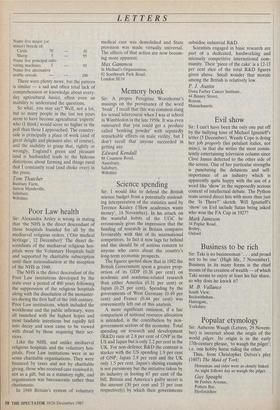Science spending
Sir: I would like to defend the British science budget from a potentially mislead- ing interpretation of the statistics used by Terence Kealey (`How academics waste money', 14 November). In his attack on the wasteful habits of the UGC he erroneously gives the impression that the funding of research in Britain compares favourably with that of its international competitors. In fact it now lags far behind and this should be of serious concern to anyone who cares about the country's long-term economic prospects.
The figures quoted show that in 1982 the British Government spent a greater prop- ortion of its GDP (0.38 per cent) on academic and academic-related research than either America (0.31 per cent) or Japan (0.25 per cent). Spending by the governments of West Germany (0.49 per cent) and France (0.44 per cent) was conveniently left out of this analysis.
A more significant omission, if a fair comparison of national resource allocation is intended, is the contribution by non- government sectors of the economy. Total spending on research and development (R&D) runs at 2.8 per cent of GNP in the US and Japan but is only 2.2 per cent in the UK. For non-defence R&D the contrast is starker with the US spending 1.9 per cent of GNP, Japan 2.8 per cent and the UK only 1.5 per cent. Japan's shining example is not parsimony but the initiative taken by its industry in footing 67 per cent of the bill. Britain and America's guilty secret is the amount (30 per cent and 33 per cent respectively) by which their governments subsidise industrial R&D.
Scientists engaged in basic research are part of a dedicated, hardworking and intensely competitive international com- munity. Their 'piece of the cake' is a 12-13 per cent slice of the total R&D figures given above. Small wonder that morale among the British is relatively low.
P. J. Austin
Dana Farber Cancer Institute, 44 Binney Street, Boston, Massachusetts










































































































 Previous page
Previous page